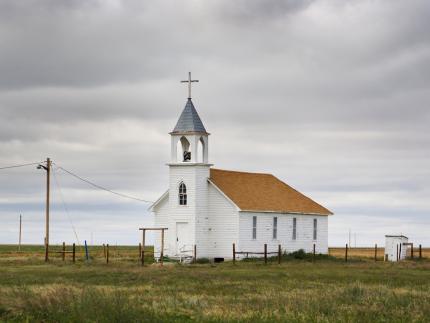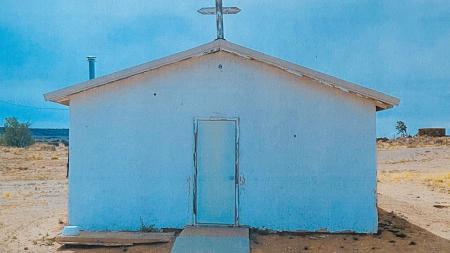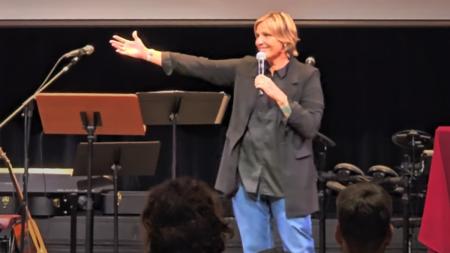Peer Group: Rural Pastors Find Common Ground

A handful of pastors drove hundreds of miles from their far-flung congregations in Iowa, South Dakota, and southern Minnesota over the past year to take part in a “Pastors Serving Rural Churches” peer group.
Helped along by a Peer Learning Group grant from Pastor Church Resources, the 10 or so pastors gathered three times in Sioux Falls, S.D. They met once to share their experiences and concerns with one another as rural pastors and twice to hear speakers who spoke on unique challenges that rural pastors face.
“In the first meeting, each person shared how Christ was working through their ministry,” said Rev. Jack Gray, the peer group coordinator, who, in retirement, has served as an interim pastor for rural churches seeking a new pastor.
In the first meeting, “after each person shared [about their ministry and concerns], the person to the pastor’s right prayed for him. It was a most powerful meeting! The Holy Spirit was truly present,” said Gray.
The pastors participating in the group cover a wide range. Some are seasoned pastors, and some are pastors beginning their career. Some are retired, some are in their last charge, and others are in their first or second charge.
“This blend benefits all of us,” said Gray. “It provides vitality to experienced pastors and mentoring to young ones.”
Gray noted that the first speaker to address the group at their second meeting was Rev. Todd Kollbaum, director of a Missouri Synod Lutheran ministry called Reaching Rural Churches for Christ. The peer group pastors could easily identify with what Kollbaum discussed; his words helped them to focus on their own struggles and offered ways to deal with them, said Gray.
“He was in the area doing an ‘Engaging the Wandering’ seminar on how to get former Missouri Synod Lutherans back,” wrote Gray in a midyear progress report. “That was very helpful for us, since sociologically the Missouri Synod is so much like us.”
The peer group’s second speaker was Dr. Nathan Hitchcock, a former professor at Sioux Falls Seminary who now has his own consulting business in which he discusses aspects of church education.
Hitchcock helped the pastors think about how they can improve their Sunday school curriculum “to meet the challenges of the rural setting where classes may have a wide age spread, sporadic attendance, and a church community that is breaking down,” noted Gray.
Gray added that he used some of Hitchcok’s suggestions in a Sunday school class that he taught the very next week: “I put into effect what he suggested. He taught me some things I had never thought about before.”
In the three sessions they held for the peer group, said Gray, “we tackled our own spiritual health and competency through the Holy Spirit, how we retain members and gather new ones in areas where the population is declining, and how we can effectively teach the members we have.”
A highlight of the meetings, Gray added, was when the pastors had a chance to pray together and share stories and experiences and, as a result, learned some things about one another and themselves.
“We are a spiritually healthy bunch, most of us deeply committed to ministry in a rural setting,” said Gray. Serving a rural church is not for everybody, he added, but it is “extremely rewarding for those willing to make a difference in rural areas.”
Most of the pastors in the peer group serve churches in farming communities, and in some cases theirs is the only church in the area. Serving a rural church, said Gray, requires being able to deal with close-knit congregations who have shared a long history together.
As a pastor, you also need to deal with high expectations placed on you, given that you may be one of the few people in town with an advanced degree. “In rural areas, people still look to the pastor as someone who has all the answers, but we need to resist the temptation” to fall into that trap, said Gray.
Right now rural churches, like so many others, are dealing with what to do about the COVID-19 pandemic. Some have been able to go online for services and other forms of ministry.
Gray recently preached at a church that had just opened for people to attend services. About 90 people were there, he said, but they observed social distancing, didn’t greet one another, and didn’t pass the offering plate. They also didn’t serve coffee. The members had also been cautioned not to attend if they felt sick and had a cough.
“Even though very few people have caught the virus out here in rural Iowa, we still use common-sense measures,” said Gray.
He added that some of the rural-community churches are joint Reformed Church in America and CRC churches. “We are intermingled by marriage and common ministry,” said Gray.
For more information on pastor peer learning and grants that can help to enhance the process, visit Pastor Peer Learning Grants.


